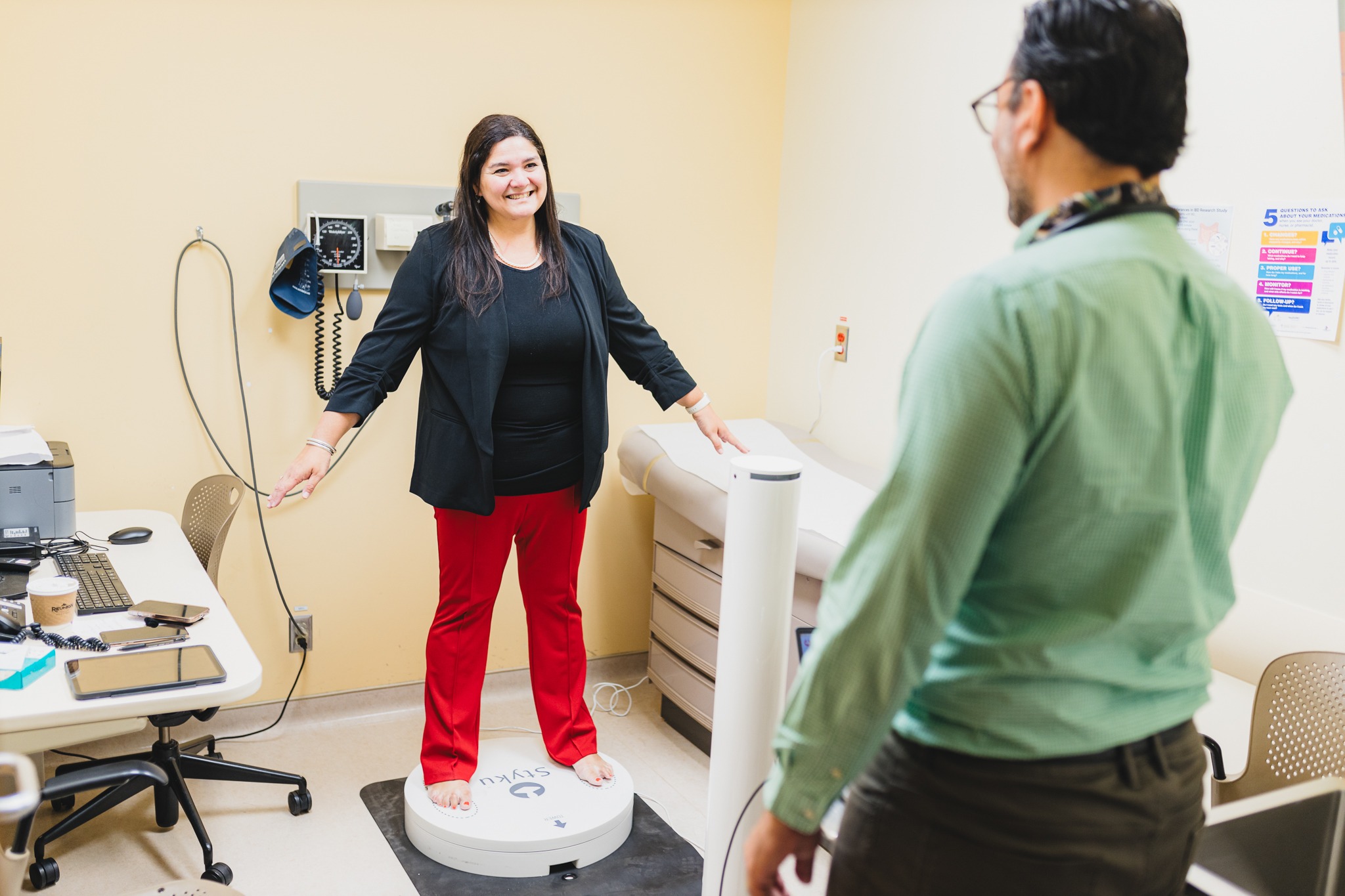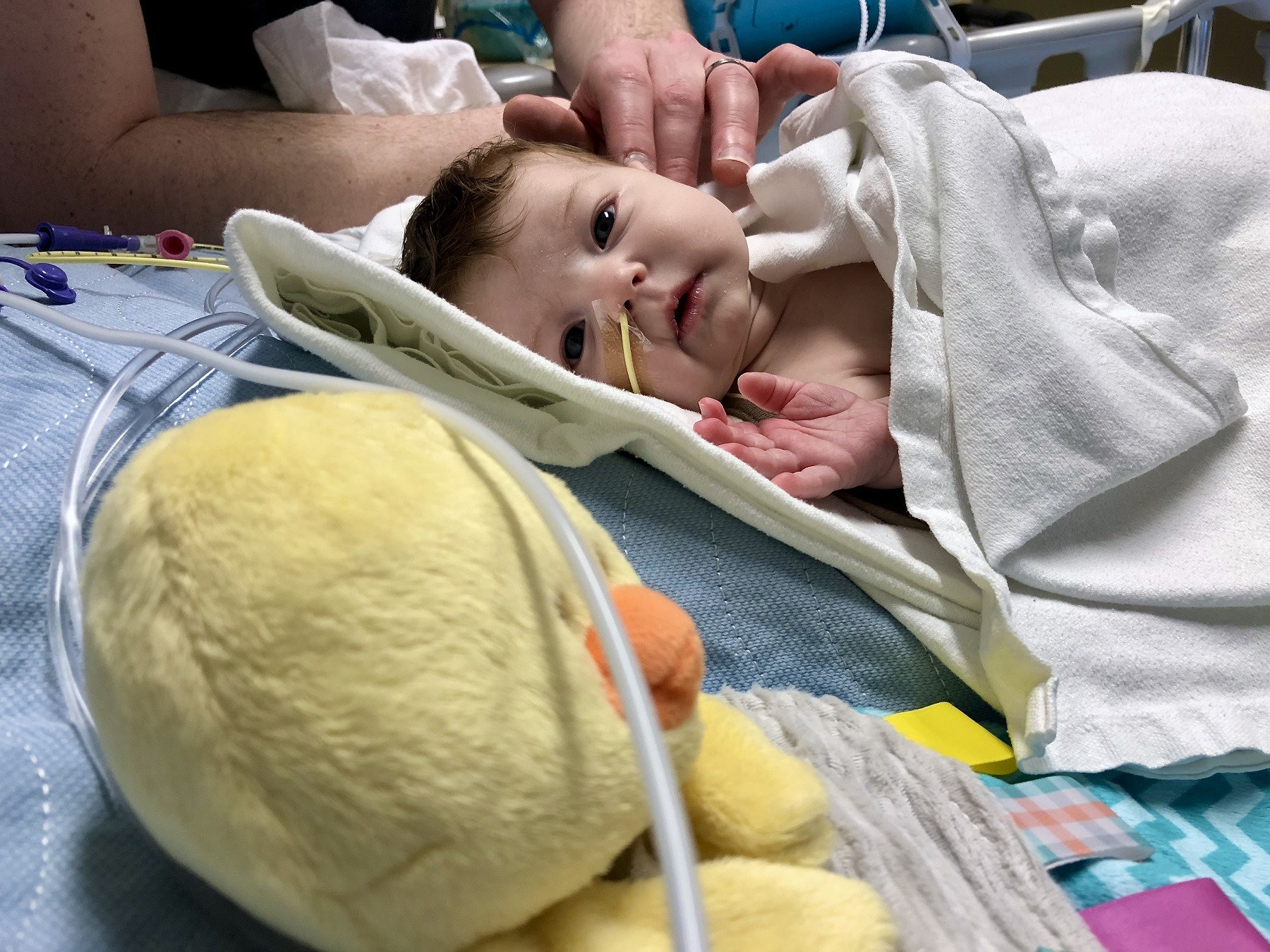
HHS cares for IBD patient as a child and adult
When Rachel Veldhuizen was nine years old, she started showing concerning symptoms including pain with bowel movements and going to the washroom frequently. While visiting different pediatricians in hopes of figuring out what was happening, her symptoms became increasingly worse, to the point where there was blood in her stool.
Rachel’s mother, Laureli, brought her to the emergency department at Hamilton Health Sciences McMaster Children’s Hospital (MCH) where she was admitted. After several tests, Rachel was referred to the Centre for Kids Digestive Health at MCH. The pediatric gastrointestinal team diagnosed Rachel with undifferentiated ulcerative colitis, a condition of inflammatory bowel disease (IBD) that is characterized by chronic inflammation of the gastrointestinal (GI) tract. Prolonged inflammation results in damage to the GI tract, and can impact a child’s quality of life.
“When Rachel was diagnosed, the relief we all felt was amazing. To finally have answers made a huge difference.”

Nurse Practitioner Emily Brackenridge
Canada has among the highest rates of childhood-onset IBD in the world, with over 7,000 children and youth under 18 years living with IBD.
“The pediatric IBD centre at MCH cares for approximately 450 children and teens with these chronic diseases – a number that is growing significantly every year,” says Emily Brackenridge, the nurse practitioner associated with the team. “The good news is that we have a great team providing very effective treatments.”
Diagnosis a huge relief
Rachel, now 17, was seen by a few different health professionals in the community over a period of about four months before she was officially diagnosed at MCH eight years ago.
“We thought that Rachel had something very serious going on inside of her body, possibly cancer, and we felt helpless to do anything to help her,” says Laureli. “We desperately needed someone to listen and help.”
As soon they received her diagnosis, her family knew that they were on the right path to get Rachel feeling more like herself again.
“When Rachel was finally diagnosed, the relief we all felt was amazing,” says Laureli. “To finally have answers made a huge difference. Yes, we knew she was sick and had a disease that doesn’t have a cure, but there were medications and doctors that could help her.”
Rachel’s health-care team provides wrap-around care involving several health care workers with different specialities. The IBD centre at MCH has a multidisciplinary team with physicians, a nurse practitioner, social worker, child life specialist and a dietitian who all work together.
Missing school and activities

Rachel and her mother Laureli are grateful to the team at McMaster Children’s Hospital.
When a flare-up occurs due to ulcerative colitis, patients may experience pain when going to the bathroom, diarrhea, blood in their stool, and frequent trips to the bathroom. Pain can be excruciating, and often patients can start to vomit, which causes them to become dehydrated, exhausted and weak.
Because of this, patients may miss school, work, extracurricular activities, and social activities. “There have been many times Rachel has missed a lot of school because she couldn’t even get out of bed or out of the house,” says Laureli. “Missing out on activities with friends is hard.”
Finding the right medications
Rachel has taken a variety of medications since being diagnosed. After finding what worked best, in 2020, she started being treated with weekly protein-based medication injections that help to control any flare-ups and manage pain. She also takes a daily anti-inflammatory agent, similar to aspirin, which helps to reduce inflammation in the bowel.
Fortunately, with the medication Rachel is currently taking, she has only experienced a couple of flare -ups. “Most of the time, Rachel’s flare-ups can be managed at home after we have contacted the MCH pediatric GI team, and they direct us on what additional medication Rachel needs,” says Laureli. “Since being diagnosed, Rachel has only been hospitalized twice during a flare-up.”
Injections are given in a pen form, and Rachel is able to give these on her own, from the comfort of home, or wherever she may be.
“Rachel has come a long way from where she started.”
Rachel is also cautious when eating certain types of foods that could irritate her digestive system. “At times, limiting certain foods was hard, especially when she was younger,” says Laureli. “As she has gotten older, she has learned to adapt to these limitations and work with them.”
Rachel visits the IBD Centre every four months, where her team checks in to monitor any symptoms, answer any questions, and see how she’s been doing overall. “The clinic team has always taken the time to answer or explain any questions or concerns that we have,” says Laureli.
Brackenridge and the team have worked very closely with Rachel over the last couple of years.
“Rachel has come a long way from where she started,” she says. “Despite the challenges she may be faced with, she’s always been very optimistic and asks questions in regards to her health.”
Transitioning to adult care
Because Rachel turned 18 in July, she will soon be part of McMaster’s Adolescent Youth Adult BD program – a unique medical service that supports adolescents’ transition to the adult clinic care at the McMaster hospital site.
“It will be important that Rachel learns how to advocate for herself.”
The intention of this program is to help young adults adapt to managing their own health care issues without parental involvement.
“As a parent, I feel that this program will hopefully make the transition to adult care go smoothly,” says Laureli. “We know that it will be important that Rachel learns how to advocate for herself, ask questions and seek out answers.”
Hamilton Health Sciences is the only hospital in Canada to have both adult and pediatric GI care in the same building, at McMaster University Medical Centre.
“Hamilton Health Sciences is truly a leading-edge institution in the way we transition pediatric services with adult services to ensure a patient’s health-care journey is as smooth as possible,” says Brackenridge.
We never felt alone
Rachel has been doing extremely well with her current medications and looks forward to attending McMaster University next year to study chemistry. As she makes the transition to the Adolescent Youth Adult clinic, Rachel and her family are thankful for the team who put her on the best path to continue to thrive as an adult with ulcerative colitis.
“We will always be grateful to the doctors, nurses, and staff at McMaster Children’s Hospital,” says Laureli. “Rachel has always received the best care there and they care not only for Rachel, but our whole family. We never felt alone in this journey.”



